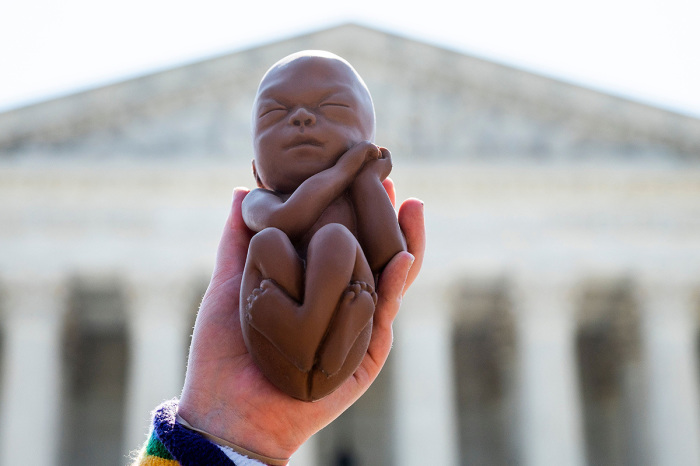Southern Baptists debate how to best be pro-life

A debate over the best legal approach to abortion and how it informs resolutions within the Southern Baptist Convention has resurfaced as messengers are set to gather for the denomination’s annual meeting next week.
At last year's annual meeting, a resolution was passed containing disputed language that has distressed some leading Southern Baptists and a divide has arisen over this issue amid the probable reversal of Roe v. Wade, the landmark U.S. Supreme Court ruling in 1973 that legalized abortion nationwide. A decision in the case Dobbs v. Jackson is expected later this month following the May 2 leak of a draft majority opinion in which Roe was overturned.
While many think the recently released Sexual Abuse Task Force report is likely to dominate the agenda of the SBC annual meeting on June 12-15 in Anaheim, California, it's also believed that the contested abortion resolution will be revisited.
Some leaders, including an SBC presidential candidate, are contending for a resolution that, to a degree, diminishes the more mainstream approach to pro-life advocacy similar to what happened last year despite strong objections from the platform voiced by leading SBC ethicists and theologians.
Nathan Finn, the provost and dean and theology professor at North Greenville University in South Carolina, believes that the rise of the abolitionist movement has come about due to frustration with the pace of incremental gains and that many politicians have opted for pragmatism instead of principle on the issue.
“I think many pro-life Christians are drawn to the language of abolition because it is so compelling, perhaps not fully understanding everything the movement represents,” Finn said in an email to The Christian Post.
What are known as “incrementalists” in the pro-life movement are those who have worked strategically over time with the goal of passing laws and winning court cases to make important legal gains and save as many unborn children as possible given the legal constraints of Roe v. Wade. Incrementalists are also of the view that in addition to the unborn babies, mothers who undergo abortions are victims of the practice, which has been enabled by Roe v. Wade jurisprudence.
By contrast, abortion “abolitionists” believe that incrementalists have compromised with evil and have undermined efforts that would legally abolish abortion immediately. They assert this despite the fact that since 1973 Roe had precluded any state or locality from making abortion illegal prior to viability.
Incrementalists then often reply by saying that they are committed to the goal of eliminating 99+% of abortions with the exception of saving the physical life of the mother in rare cases and stress the importance of overturning Roe, a crucial win for which they have been working for decades.
Proponents of the abolitionist viewpoint have backed proposals, such as the Abolition of Abortion in Louisiana Act of 2022, which made it out of a state Legislature Committee but was ultimately scuttled. This was due in part to incrementalist leaders who signed a May 12 National Right to Life Committee open letter emphatically urging state lawmakers to reconsider and especially not criminalize mothers who undergo abortions. Among those pro-life leaders who signed the NRLC letter was Brent Leatherwood, acting president of the Ethics & Religious Liberty Commission, the SBC’s policy arm.
Finn added that he spoke with many SBC messengers last year who simply thought that abolitionism was another way of affirming the pro-life cause but did not realize the movement is actually an alternative vision that rejects every gain of the past generation.
“The abolitionist movement callously treats all women who have had abortions as murderers. The abolitionist movement coldly dismisses incremental gains that have saved millions of lives. I am genuinely thankful the abolitionist movement is anti-abortion. I just wish they were also consistently pro-life,” he said.
Reached by phone Friday, Tom Ascol, an SBC presidential candidate this year and the pastor of Grace Baptist Church in Cape Coral, Florida, told CP in an interview that the overwhelming majority of Southern Baptists are “completely pro-life” and want abortion to be illegal and ended immediately and to see the right of personhood legally recognized for the unborn. Yet he disputes the way in which this particular disagreement within the denomination has been framed.
Speaking of the letter from the National Right to Life Committee which over 70 pro-life groups and leaders signed, including the SBC’s ERLC, Ascol commented: “I found that to be disastrous.”
“I thought that was a complete misrepresentation of what most Southern Baptists believe,” he added.
“The ERLC has been planning for over a year the acknowledgment of the 50th anniversary of Roe v. Wade. Why not put all of our resources into ending Roe v. Wade before the 50th anniversary?"
Ascol reiterated: “It’s not so much incrementalism versus abolitionism. Anything we can do to save one child, let’s do. But let’s not take our eye off the prize of ending abortion now.”
Other incrementalists, such as Richard Land, who served as the ERLC president from 1988 to 2013, and is now president emeritus of the ERLC and the executive editor of this publication, responded in a CP interview by saying, "that is exactly why pro-lifers have been working so hard for the past 48 years to get pro-life Supreme Court justices appointed so that we that could overturn Roe."
Leatherwood, the ERLC's acting president, insists that the idea that any SBC leader is not seeking the end of abortion is patently untrue.
“Every pro-life advocate I’ve ever met is striving for the same goal — the end of abortion. And it should be stated, we all want that as soon as possible. The approach of the pro-life movement, the Southern Baptist Convention, and the ERLC for all these years has been to support laws that will save one additional life in whatever context,” Leatherwood said in an email to CP on Friday.
“Thankfully, it appears those efforts have brought us to the cusp of what may be the biggest pro-life achievement in 50 years.”
Yet Ascol disagrees with the assessment of SBC ethicists who say the messengers did not fully comprehend what they were voting on with all of its legal implications contained in its wording. That the messengers overcame the resolution when it was tearfully argued against from the platform, is evidence of this, he says.
Several SBC ethicists who have favored and continue to support the more gradual, incremental approach and the eventual abolition of virtually all abortions wrote in the Public Discourse last year why they opposed the resolution. They explained at the time that one of the problems that can happen at annual meetings is that messengers are given far too little time to consider resolutions that may appear noble but are, in fact, layered with complexity. Such was the case in Nashville on the abortion resolution, they stressed.
Ascol, however, is convinced that most Southern Baptists did grasp its meaning.
“There were 7,500 copies of this resolution printed up and distributed to the messengers at the convention. More messengers probably read this resolution than any other resolution that was voted on last year. With full understanding, against all the efforts of the platform, an overwhelming majority of Southern Baptists adopted the strongest anti-abortion resolution in our history,” he said.
In a May 31 episode of "The Sword and the Trowel" podcast, which Ascol co-hosts with Graham Gunden, the Florida pastors interviewed Bradley Pierce, a constitutional attorney from Texas who is the executive director of the nonprofit Foundation to Abolish Abortion. Pierce was an instrumental force behind the Louisiana bill that was ultimately scrapped and he maintained that among the most substantial opposition to that bill were other pro-life groups. Those groups, he said, misrepresented its provisions. He defended the legal lens he has on this as the one most faithfully grounded in Scripture.
“I’m firmly convinced that God requires equal protection,” Pierce told the hosts in the podcast interview. Speaking of his approach, he added: “The same laws that protect born people should protect people before they’re born.”
Under the legal regime that he is proposing, the justice system would consider each case on a case-by-case basis, recognizing the variety of situations in which an abortion happens.
In their article outlining their dissent from last year’s resolution, the SBC ethicists approvingly cited a 2020 essay from Life Training Institute’s Scott Klusendorf on why the incremental strategy is the most viable and moral pathway.
“Pro-lifers are not the ones compromising when we support incremental laws aimed at limiting the evil of abortion. Rather, the pro-abortionist is compromising because he’s forced to give ground on the current status quo — namely, that any child can be killed at any point in pregnancy for any reason. When pro-lifers chip away at the status quo, they are improving the moral landscape,” he wrote in Desiring God at the time.
Klusendorf explained in a phone interview with CP that Southern Baptists need not divide theologically over this debate, describing the divisions within the denomination as “a very sad thing.”
“We can have an in-house discussion on tactics, on whether we ought to go forward with a more aggressive rate than we have, that’s all fair and good. And if abolitionists want to join that discussion in good faith, I’m all for it. But that’s not what they’ve done,” he said.
Although Klusendorf mostly agrees with Ascol theologically and appreciates his public stances on such issues as critical race theory and “opposing the wokeness trend” in the denomination, he believes Ascol is “poisoning the well” by referring to incrementalists as elitists and is doing considerable damage by adopting the language of last year’s resolution which regards incrementalists as not only mistaken but are in fact party to murder and thus theologically compromised.
In a recent Founders Ministries essay, titled “Toward a Principled Pro-Life Ethic in Post-Roe America," Ascol argued that the efforts by incrementalists are representative of the contentiousness in other areas of Evangelical life, wherein “it is the elite class that is woefully out of step with the rank-and-file believers.” These rank-in-file believers, he maintains, want “to see the scourge of abortion brought to an immediate end in our nation.”
Land believes that most Southern Baptists are incrementalists and that it is the most morally consistent pro-life ethic. When asked what he makes of Ascol’s characterization of the incrementalist approach as an “elitist” stance, Land replied that he "can think of no more elitist position than to say that it’s all-or-nothing, that if we can’t have it all we’re going to let babies continue to die. That’s sacrificing unborn babies on the altar of your perceived purity on the position.”
Land went on to defend the work of the ERLC, saying that state legislators are going to need resources as states are given the opportunity to rework their laws in light of the possible reversal of Roe v. Wade. If indeed it is overturned, the parameters of legal abortion are returned to the state level. In anticipation of the dismantling of Roe, some state governments are likely to enact substantial abortion restrictions.
“Last year’s resolution flies in the face of nearly a dozen resolutions passed by the Convention since 1980, which called for the abolition of all legal abortion with the exception of saving the physical life of the mother,” Land explained, "and on several occasions, there were attempts to amend the resolutions to include exceptions for rape and incest and they were voted down by the messengers."
Klusendorf believes that abolitionism sets forth a policy framework that is an untenable legal quagmire. For example, he told CP that in order to charge an abortionist with murder and also the mother with murder one would have to demonstrate in court that the “meeting of the minds” legal threshold has been met. One would have to prove that the mother’s knowledge matches the abortionist's knowledge and that is seldom the case.
Land added that some confusion concerning the ERLC results from a lack of understanding of the ERLC's two-fold assignment from the SBC.
"First, we are to call Southern Baptists to be where we think they ought to be on moral issues based on biblical revelation. In that role, we are free to be 'the conscience of the Convention.' Our second role is that once Southern Baptists have reached consensus on an issue, to share that with the three branches of the federal government, with state governments and with the United Nations," Land said.
"In the first role, we are free to be prophetic and prescriptive and we are speaking to Southern Baptists. In the second role, we are to be descriptive, speaking about Southern Baptists, even when that description does not match where we would deeply desire Southern Baptists to be. Of course, we are profoundly grateful to our Heavenly Father that Southern Baptists are now the most pro-life major denomination in America at the rank-in-file level."
In previous years, the ERLC filed numerous friend of the court amicusbriefson abortion-related cases in which they always added footnotes that said: "While Southern Baptists are overwhelmingly opposed to abortion-on-demand, there is some disagreement about some of the troublesome exceptions such as rape, incest, and the physical life of the mother."
"That was our assessment based upon surveys and polling on where Southern Baptists were, which is not necessarily where we would wish them to be," Land explained.
"Southern Baptists do expect us to be truth-tellers and so we must attempt to tell the truth as best we perceive it. I do not think most Southern Baptists would wish the ERLC to do otherwise. If we did, we would ultimately lose credibility with Southern Baptists and with the governments we are trying to influence," he said.
Yet Ascol insists that many SBC congregants are disappointed with the efforts of the ERLC which joined with other pro-life groups to spike the recent Louisiana bill. One such pastor who shares that view is Christopher Bolt, who concurs with the SBC presidential candidate’s framing of the discussion.
Bolt, pastor-teacher at Elkton Baptist Church, in Elkton, Tennessee, said in a CP phone interview that though he hesitates to call himself an abortion abolitionist, per se, he nevertheless believes that abortion abolitionists have some important points that ought to be more thoroughly considered.
“I believe in equal protection for the unborn under law. I believe that the unborn child is even more vulnerable, extremely vulnerable, can’t even live on his or her own, and we should center the unborn child in the discussion,” Bolt explained, echoing Pierce.
“And the reason that even in criminalizing the fact of abortion when a woman willfully and knowingly does it is that the Bible teaches justice and our laws are to reflect the justice we see in Scripture.”
Where criminalizing only the abortionist performing the act falls short is that the United States is potentially facing a future where many if not most abortions will be done chemically and at home via the mail, he added.
"But when a young woman finds herself [facing a crisis pregnancy] I’m not saying, ‘That woman should be punished as a murderer, no ifs, ands or buts.’ That’s not my view. What I am saying is that we must, at some point, in terms of the increments we’re pursuing regarding abortion, one of the increments is the end of abortion.”
Leatherwood told CP that should Roe be reversed, the ERLC’s work will be far from over, noting that a major focus of the annual meeting will be how Southern Baptists can engage in pro-life work in their home states. The SBC entity has larger legal and cultural aspirations in mind.
“The reality is, we long for a day when a national, constitutional protection of life is extended to every person equally, including our preborn neighbors,” Leatherwood said.
“So the bottom line is this, just as the pro-life movement and the Southern Baptist Convention have long stood for, our work will keep these objectives at the forefront: ban abortion, save preborn lives, support mothers, and punish the abortion providers.”
Send news tips to: brandon.showalter@christianpost.com Listen to Brandon Showalter's Life in the Kingdom podcast at The Christian Post and edifi app Follow Brandon Showalter on Facebook: BrandonMarkShowalter Follow on Twitter: @BrandonMShow





























